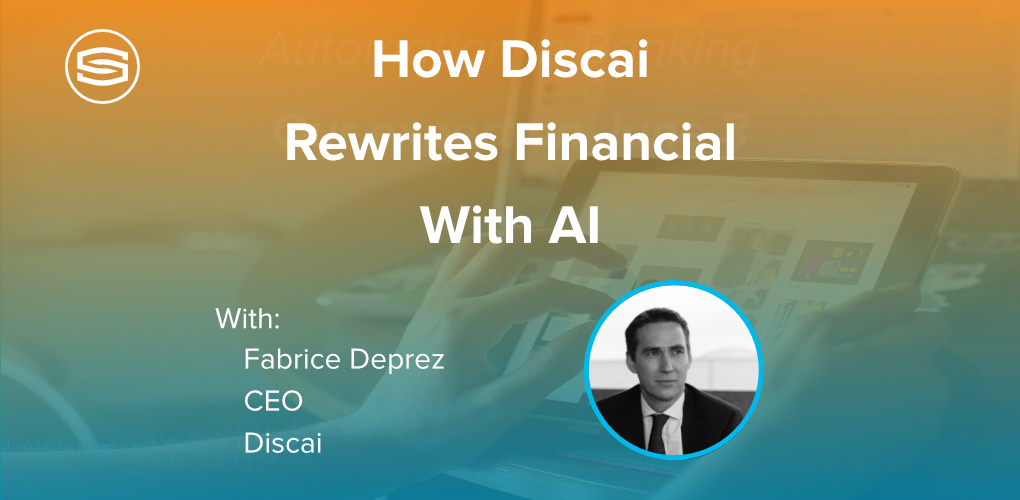
Insights & Opinions
How Discai Rewrites Financial With AI
Mon, 11 Apr 2022


KBC Group has been a front runner in the financial sector for many years, not just in Belgium but also internationally. To make this concrete: SIA Partners voted their mobile app as the best banking app worldwide. "Technology is the future, and has become a strategic element in our core business", they say. To unlock the enormous potential of AI technology and the considerable expertise built up by KBC in this field, and also to turn (some of) the IT investments into a profit centre, they founded Discai.
As a full subsidiary of KBC Group, Discai commercialises KBC's innovative AI applications that have been developed in-house. It made me curious, so I invited their CEO, Fabrice Deprez, to The Banking Scene Afterwork.
A BankTech to fight financial crime
Over the years, KBC invested a lot in innovation and digital financial services solutions. They developed around 50 AI-based applications in-house, of which 20 are IP protected.
Fabrice explained that one of the reasons KBC founded Discai was to get a return on these investments by commercialising some of these innovations. They started with financial crime solutions. Needless to say, it is a hot topic at every bank these days. Who isn't looking at improving their fight against financial crime?
Every bank needs to fight financial crime, and it falls outside the competitive space of a bank, so the financial sector as a whole may also be interested in working with Discai.
Based on 130 data points, Discai analyses transactions and identifies the risky ones. It filters the true positives for the investigators to do the human analysis before notifying a selection to the regulator for review.
Where traditional methods reach 10% to 15% efficiency, with 5% to 10% of these being true positives, Fabrice claims their solution lifts the efficiency towards 50% with significantly higher productivity of the investigations team, both for the bank and the regulator.
Unlike a traditional FinTech, KBC Bank sees a couple of reasons to call it BankTech, to differentiate from other providers. First of all: the solution has been proven successful in recent years in KBC Group across different countries. Another reason is the business continuity element: Discai can fall back on an army of 120 data scientists of KBC Bank and its financial resources.
The commercialisation is a partnership of three where KBC provides the developers, Discai does the commercialisation and maintenance of the end-product, the training, modelling, etcetera and KPMG is the implementation partner.
Discai offers an application to its customers, with clear walls between these customers. They don't intend to mutualize any data at this stage. Of course, customers can benefit from system improvements when they observe that new data points would add additional value.
Yes, a FinTech company can fall back on full independence. Still, Fabrice is convinced that being a BankTech outweighs the advantages of being an agile, small and independent player, definitely for financial crime solutions.
Ethical AI aligned with KBC's values
We put the learnings on AI and ethics, from the session on March 24, into practice and spent a reasonable time on the values behind Discai. After all, perhaps even more than with other FinTech companies, ethics are fundamental to Discai since their business also reflects on the mother company KBC Group. Fabrice confessed that in his first interview with Johan Thijs, KBC Group's CEO, 1/3 of the discussion was on ethics, asking Fabrice all kinds of dilemmas to see how he would react.
Fabrice explained: "Our solution does not decide what an alert is and what is not. The final evaluation and reporting is always a manual process. Also, on all transactions, we always keep a track record of what the rating is and the rating is on a person which is considered suspicious, with an explication why we gave that score."
Transparency is the backbone of Discai's solution. For example, Fabrice gave transparency and ethics as to why they don't use social media information. They consciously chose to use only data that the customer intentionally shared with the bank.
On top of that, they will also screen their clients before onboarding them. Fabrice: "If we doubt a bank, their intention, the country, anything, we will not hesitate to say we won't be selling there. If we hesitate, it can be even brought to the group level to decide."
Fabrice: "We need to have the right people who work transparently with a system that is explainable and keeps a track record of what it's doing."
What's next?
KBC Group has 20 IP protected AI solutions in-house that can potentially be commercialised, covering many financial domains. So what's next for Discai?
First, they wish to grow their financial crime offering going from embargo screening, fraud, till cyber fraud. Fabrice: "The idea is to have full coverage of financial crime in the broad sense. Look at it from our point of view of what is unsafe. I believe we will be able to cover most of it by the end of 2024, so that's one element."
A second domain they are looking at is the applications they developed for process optimisation for their insurance business, including automated claims handling, interpreting pictures of a car, the declaration of an accident, etc.
Conclusion
Once again, KBC is demonstrating its leadership in digital banking. Out of experience, I know it is not the first time that they commercialise internal developments. Although I understand the context and the times have changed, I remain curious to see how successful Discai will be in helping the financial services industry fight financial crime.